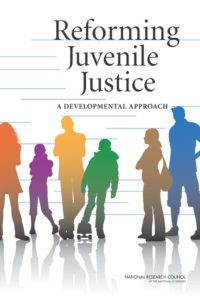Science of Adolescent Development Continues to Inform Juvenile Justice System
 Over the past decade, state and local jurisdictions have been actively developing strategies to reduce both recidivism and spending in their juvenile justice systems. Many also seek to ensure that every youth who comes in contact with the system is met with procedural fairness at every stage of the justice system. To help accomplish these goals, juvenile justice leaders are examining and applying research and recommendations outlined in Reforming Juvenile Justice: A Developmental Approach, a seminal report released by National Research Council in 2012. This report provides an extensive review of decades of research on juvenile justice programs and practices. It also delineates how the adolescent development field can serve as a framework for developing strategies across the justice system continuum that promotes positive outcomes for youth involved with the juvenile justice system.
Over the past decade, state and local jurisdictions have been actively developing strategies to reduce both recidivism and spending in their juvenile justice systems. Many also seek to ensure that every youth who comes in contact with the system is met with procedural fairness at every stage of the justice system. To help accomplish these goals, juvenile justice leaders are examining and applying research and recommendations outlined in Reforming Juvenile Justice: A Developmental Approach, a seminal report released by National Research Council in 2012. This report provides an extensive review of decades of research on juvenile justice programs and practices. It also delineates how the adolescent development field can serve as a framework for developing strategies across the justice system continuum that promotes positive outcomes for youth involved with the juvenile justice system.
Specifically, the report outlines key areas that juvenile justice systems should address in order to promote healthy adolescent development. These areas include the involvement of family, positive peer groups, and activities that build decision-making and critical-thinking skills. It also discusses the aspects of adolescent brain development that influence illegal behavior in youth and the mounting evidence that such behavior desists in most adolescents as they enter young adulthood.
This research has sparked much discussion about youth culpability and to what degree adolescent offenders should be held accountable for particular crimes, given their inherent biological and neurological chemistry.[1] This discussion has in turn contributed to changes in some states where legislation distinguishes juveniles from adult offenders and where policies and practices that hold youth accountable have been modified to be more developmentally appropriate.
On July 23, 2013, the Coordinating Council on Juvenile Justice and Delinquency Prevention (Coordinating Council) held a quarterly meeting to explore how the report’s recommendations might be widely applied. The Coordinating Council serves as an independent body within the executive branch of the federal government. Its primary functions are to coordinate federal juvenile delinquency prevention programs, federal programs and activities that detain or care for unaccompanied juveniles, and federal programs relating to missing and exploited children.
At the meeting, the Office of Juvenile Justice and Delinquency Prevention (OJJDP) Administrator Robert L. Listenbee acknowledged the significance of this report. “We at OJJDP believe that this report’s findings and recommendations can transform how policymakers, practitioners, and researchers address the needs of children who are at risk for involvement or who are already involved in the juvenile justice system,” he said.[2]
At the meeting, the Committee on Assessing Juvenile Justice Reform presented on how OJJDP should consider a more developmentally appropriate approach to its grant-making decisions, policies, and program development and technical assistance activities. “If the procedures for holding youth accountable for their offending and the services provided to them are designed and operated in a developmentally informed way, this approach will promote positive legal socialization, reinforce pro-social identify, and reduce reoffending,” said Mr. Listenbee.[3]
To read more about the Coordinating Council, click here. To read about this recent meeting, click here. To read the NRC report, click here.
[1] Richard J. Bonnie, Robert L. Johnson, Betty M. Chemers, and Julie Schuck, eds., Reforming Juvenile Justice: A Developmental Approach (Washington: National Research Council of the National Academies Press, 2012).
[2] Quote was cited in the OJJDP Newsletter for July/August 2013 in an article entitled: “National Research Council Report on Juvenile Justice Reform Highlighted at Coordinating Council Meeting,” available at http://www.ojjdp.gov/newsletter/242652/pfv.html
[3] Quote was cited in the OJJDP Newsletter for July/August 2013 in an article entitled: “National Research Council Report on Juvenile Justice Reform Highlighted at Coordinating Council Meeting,” available at http://www.ojjdp.gov/newsletter/242652/pfv.html.
A positive school experience, where a child feels secure, is essential for their well-being. However, for many children…
Read MoreWhen returning to their communities from criminal justice settings, people with behavioral health needs face barriers in accessing…
Read More Supporting Children of Incarcerated Parents: Reimagining School and Community Collaboration
Supporting Children of Incarcerated Parents: Reimagining School and Community Collaboration
A positive school experience, where a child feels secure, is essential for their well-being. However, for many children with incarcerated parents—one in 14 in the U.S.—school can feel far from safe due to stigma, trauma, and a lack of understanding.
Read More Bridging Communities and Correctional Systems: Q&A with CSG Justice Center Advisory Board Member Commissioner Nicholas Deml
Read More
Bridging Communities and Correctional Systems: Q&A with CSG Justice Center Advisory Board Member Commissioner Nicholas Deml
Read More
 Assigned to the Cloud Crew: The National Incarceration Association’s Hybrid Case Management for People with Behavioral Health Needs
Assigned to the Cloud Crew: The National Incarceration Association’s Hybrid Case Management for People with Behavioral Health Needs
When returning to their communities from criminal justice settings, people with behavioral health needs face barriers in accessing basic needs—including food, housing, employment, transportation, education, clothing, and substance use and mental health services—which increases their risk of experiencing a crisis.
Read More Meet the Medicaid and Corrections Policy Academy Mentor States
Meet the Medicaid and Corrections Policy Academy Mentor States
New Hampshire Department of Corrections Commissioner Helen Hanks presents at the Medicaid and Corrections Policy Academy in-person meeting.
Read More Taking the HEAT Out of Campus Crises: A Proactive Approach to College Safety
Taking the HEAT Out of Campus Crises: A Proactive Approach to College Safety
The sharp rise in school shootings over the past 25 years has led school officials across the U.S. to take a closer look at ways to keep students safe. For Chaffey College in Rancho Cucamonga, California, a tragic incident at a nearby university hit close to home and spurred campus leaders to revisit their own school’s threat assessments and crisis responses.
Read More










